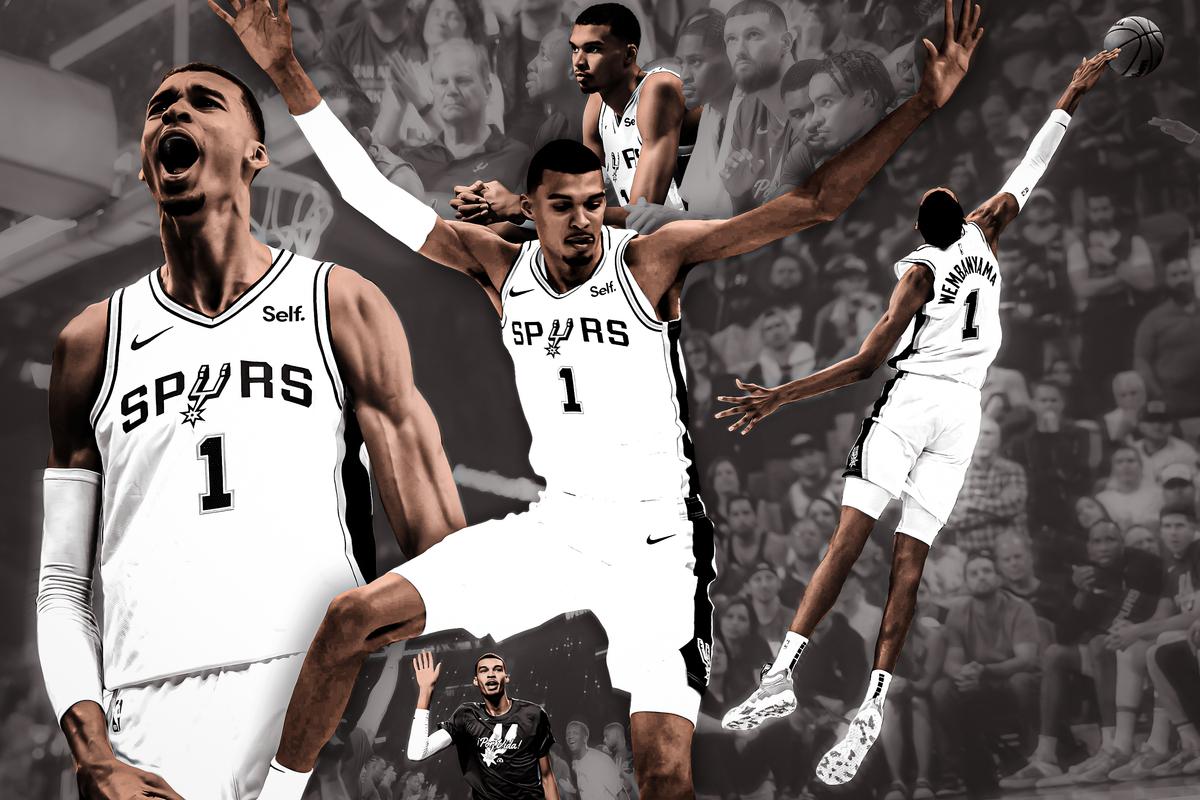
Fantasy epics don’t always begin with triumph, or even reasons for optimism … right? Wemby, ever the bookworm, would know better than I. But as the world follows the hero’s journey that feels predestined for Victor Wembanyama, the young phenom’s first taste of frustration and defeat at the NBA level—a 126-119 loss to the Dallas Mavericks at home in San Antonio—has set the table for what will be a season of discovery full of fits and starts.
It was a disappointing debut if only because there is a distinct wonder to Wemby that he does not shy away from. At one point in the preseason, Wemby talked about visualizations he’s had in his mind about his place on the court, and the things he could do in any particular instance—mentally charting the limitless frontier of his own abilities. The promise of Wembanyama is his capacity to actualize those impulses into movements and actions and feats that no one has ever seen before. But his debut on Wednesday night was largely defined by his absence. Early foul trouble jarred the San Antonio Spurs rookie from any kind of rhythm he had hoped to develop; frustration mounted as he was repeatedly unable to field the ball while down in the post; the bulk of his fouls were the result of a poor sense of timing.
In a shocking turn of events, Wembanyama wasn’t even the best rookie in the game: Mavs center Dereck Lively II was undeniable in his own regular-season debut, notching an efficient double-double and already demonstrating uncanny chemistry with Luka Doncic in the pick-and-roll. Lively’s job and placement on the court are clear as day and have been since the second Dallas traded for him back in June. That was his biggest advantage.
Meanwhile, for most of the game, Wemby seemed adrift on offense. How do you use a player who can conceivably do anything and everything? It’s a question that has given coach Gregg Popovich a new lease on life, transitioning from the scolding father he was in San Antonio’s dynastic years into the supportive grandpa, as happy as anyone to see what the newest addition to the family can do. But his newfound attitude toward the kind of wild, freelancing genius that used to drive him up the wall belies the challenge at hand. For all the parallels drawn to the franchise’s past, Pop has never shepherded a player quite like Wemby—someone so unwilling to be boxed in by preconceived notions.
The lineage of Spurs franchise giants that Wembanyama succeeds has largely been defined by orthodoxy, in one way or another. David Robinson was an inquisitive Navy brat who followed in his father’s footsteps, only to experience a surprise second growth spurt that made him far too tall to serve on any naval ship—he turned to basketball, where his size and athleticism made sense (and dollars), and became one of the most prolific centers in NBA history. Tim Duncan, the quintessential NBA big man and iconic ascetic, used basketball as a means of satisfying the only desire he’s ever publicly disclosed. “Everything I do is basic, and that doesn’t sell,” Duncan once said. “I don’t have the icing. My icing is, I just want to win.” Both Robinson and Duncan were more than willing to operate within a specific framework, to embody classical archetypes, to come as close as possible to stripping away the trappings of ego completely. To set the standard for the Spurs Way.
Wembanyama’s drive seems rooted elsewhere. “I don’t want to limit myself to what’s already been done,” Wembanyama said during the preseason. “I don’t want to limit myself to what’s conventional.” Any prescribed framework feels too restrictive. And for a brief, three-minute burst in the fourth quarter on Wednesday, we caught a glimpse of the myriad ways Wemby can stun defenses with his combination of size and skill. A decisive alley-oop finish off a pick-and-roll with San Antonio’s second-most important player in Devin Vassell. A confident, unbothered pull-up 3-pointer over the outstretched arms of Lively (who himself has a not-insignificant 7-foot-8 wingspan). A quick-and-easy dunk off a hit-ahead pass from Tre Jones not five seconds into the shot clock. A midrange jumper over Grant Williams, with Wemby moving off the ball using a cross screen from Vassell.
That nine-point deluge was long overdue, but Wemby, who finished with 15 points on 6-of-9 shooting in 23 minutes, wasted no time at all flashing his defensive potential. It took less than a minute into the game for Wemby to demonstrate the havoc he can wreak with his 8-foot wingspan, blocking a midrange pull-up from Kyrie Irving, who did not account for Wembanyama’s baffling ability to enter the frame from the weak side. Wemby’s roving help defense will routinely cause nightmares, but in a game in which he was plagued with foul trouble, his hyper-aggression got the best of him: His fifth foul was an ill-advised reach-in, only 26 seconds after he’d checked back into the game at the beginning of the fourth quarter. Wembanyama’s absurd reach allows for unprecedented degrees of defensive coverage, but it also means his limbs will be in harm’s way more often than not. Length, mobility, and aggressiveness are essential to the modern defensive big man, but managing the three in concert without getting engulfed in foul calls has been the struggle for just about every other mobile rim protector who has stepped into the league recently. Wemby may be eyeing transcendence, but Wednesday was a necessary reminder that he’s still a rookie adjusting to the NBA’s speed and whistle. Luckily for Wembanyama, the league is also going to have to adjust to him.
Earlier this week, we were privy to some physical comedy during a Mavericks practice: Assistant coach God Shammgod, strapped with padded arm extensions that looked like preposterously long muay thai kicking pads, stepping out to defend Mavs players, shouting “Wemby!”—as though practice were a wine tasting session and the mere mention of tasting notes would be enough to evoke Wembanyama’s presence. It’s the same kind of simulation that teams would have run to prepare for Shaq three decades ago—unfortunately, there hasn’t been much progression in terms of the technology at hand.
And just like Shaq across the ’90s and aughts, Wemby’s sheer dimensions (and the game-wrecking potential encased within) change everything. NBA athletes are fine-tuned to control what they can control and operate on both ends of the floor with an understanding of what a leaguewide baseline in various skills looks and feels like, learned over time through repetition and observation. Players like Shaq back then and Wemby now break the scale.
With a presence like that on the court, basketball can go from an exercise in chemistry to an exercise in theoretical physics—even on an off night. Time will tell whether those limbs and that hypermobility at 7-foot-4 ever get easier to process.


